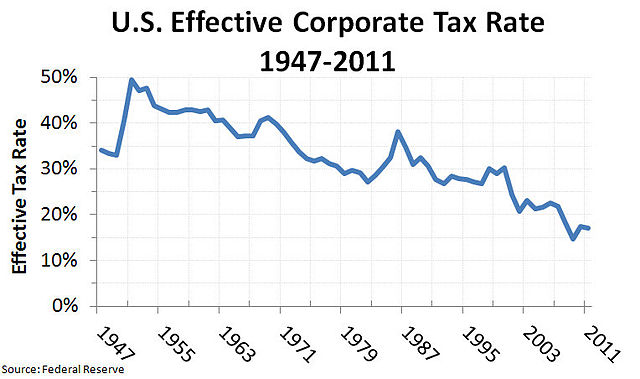Corporate Taxes: What Level Should They Be?
Pictured is the decline of US corporate taxes over the past 60 years. This decline has coincided with a 2900% increase in the GDP per capita.
On Monday, September 13th, Democrats in the House of Representatives released their plans to increase the corporate tax rate from 21% to 26.5%, along with a capital gains tax increase and an increase on ultra-high earners. This brings up the question: what should the corporate tax rate be?
Before the Trump tax plan was enacted in 2017, the US corporate tax rate was 35%. At that point, that was the highest corporate tax rate of any developed country in the world. Most developed countries have a corporate tax rate between 20-25%. For example, Denmark’s is 22%, Sweden’s is 21.4% and England’s is 19%.
Corporate taxes should not be compared to individual income taxes or capital gains taxes because a CEO or shareholder is not fully entitled to the profits of that company. For example, Jeff Bezos owns 16% of Amazon, but has never directly taken home a profit from Amazon. This is because he doesn’t have majority ownership over the company, and therefore is not capable of taking Amazon’s profit. Amazon also has never paid a dividend, which means they have never distributed the profits of the company to the shareholders. Rather, he is worth $180 billion because of an increase in the value of Amazon as a company, which increases the value of his shares. So, with that context, a corporate tax is not a tax on the rich, it is a tax on the corporation directly.
Corporate taxes should be set at a level that does not materially affect the business and the growth of the business, while also delivering adequate tax dollars to the government. According to Taxfoundation.org, an independent think tank, an increase of the corporate tax to 28% would decrease GDP by $160 billion per year (or 0.7%), eliminate 138,000 jobs and decrease the wage rate by 0.6%.
Essentially what a higher corporate tax rate does is increases the cost of capital. This increase in cost reduces investment back into the business and therefore decreases the growth of the business. By reducing the capital investment, corporations are subjected to lower long-term productivity growth, which in the end results in lower wages and fewer jobs.
The positive effects of high corporate taxes show up most in the amount of “unicorns” companies there are. To be a “unicorn”, a company must be private, meaning it’s shares are not publicly traded, worth over 1 billion dollars, and growing fast. These companies are most sensitive to a high corporate tax rate because the high corporate tax rate decreases the amount of money they can invest back into the business. Since 2017, when the corporate tax rate was lowered from 35% to 21%, the amount of new “unicorns” has gone from 120 to nearly 300. While it’s hard to pin it all on the corporate tax rate decrease, it is definitely a contributing factor.
Because of this, I think that there should not be a corporate tax rate increase. The marginal benefit of a corporate tax rate increase is not worth the negative effects that it brings. If the government wants to tax rich people, or prevent companies from hoarding money, there are better ways than levying taxes that negatively impact the growth prospects of businesses, employees and shareholders.

Charlie is an interested and passionate senior at Boulder High. This is his first year on the Owl staff and he is excited to learn about journalism and explore his passion for writing. He joined the Owl hoping to find a community of writers and journalists that shared similar interests and passions. Outside of school, you can find Charlie doing anything that involves the outdoors. Charlie is very interested in financial markets and economics, and he regularly writes about financial markets in his newsletter. He also likes to play all types of sports, whether it is dodgeball or nordic skiing. Fun fact: he once played a game of dodgeball with grapes. He played with red grapes because he would prefer...


